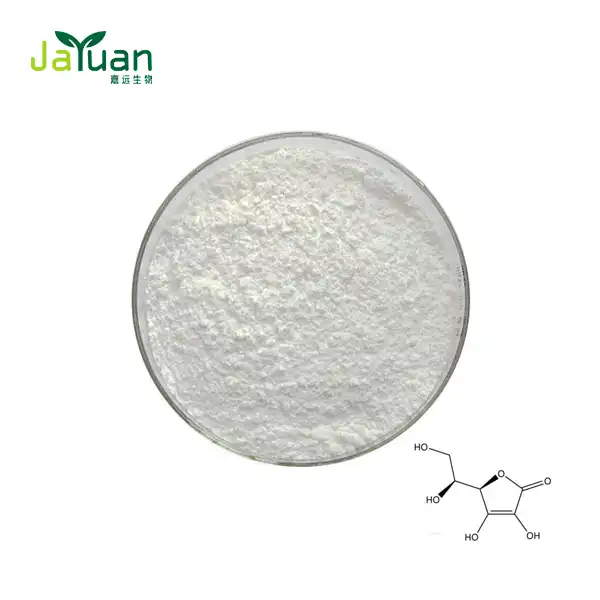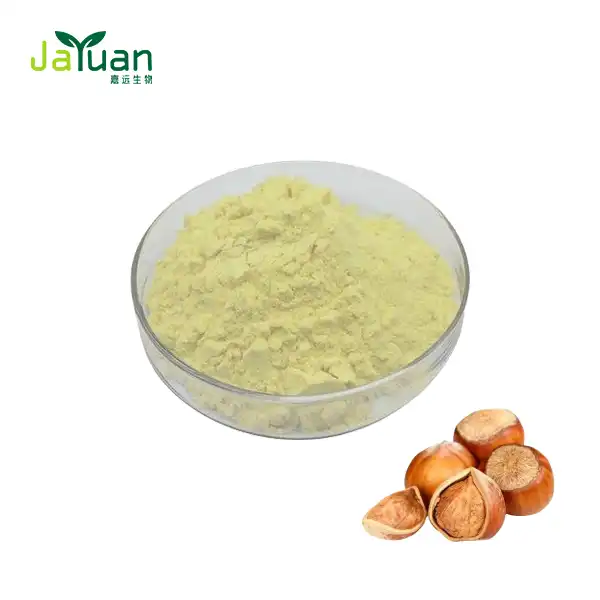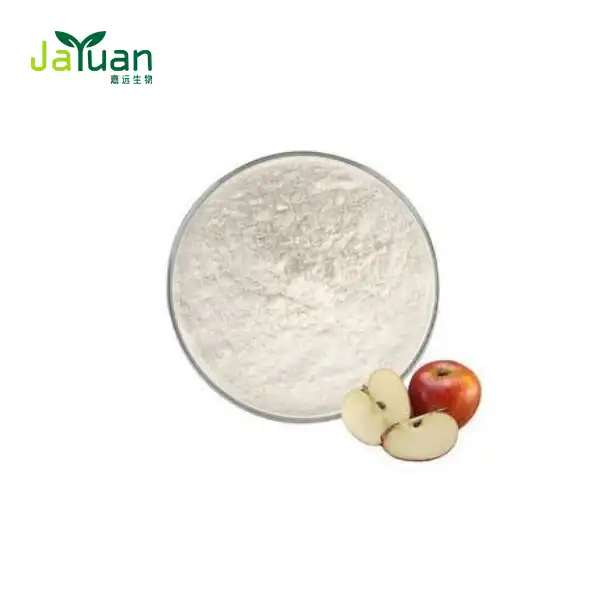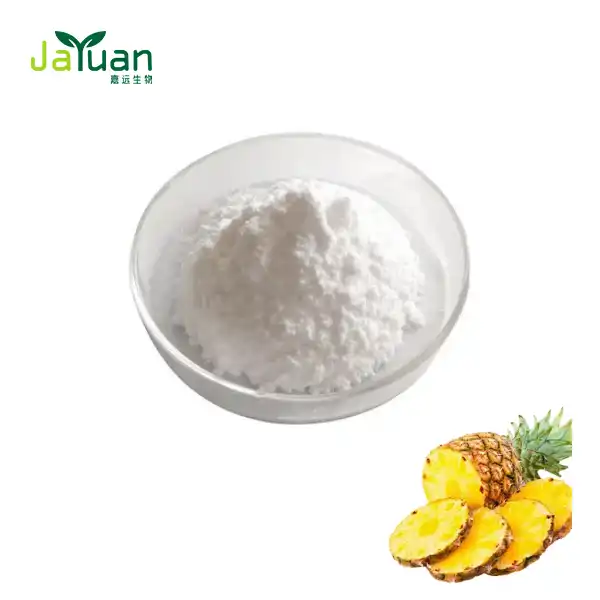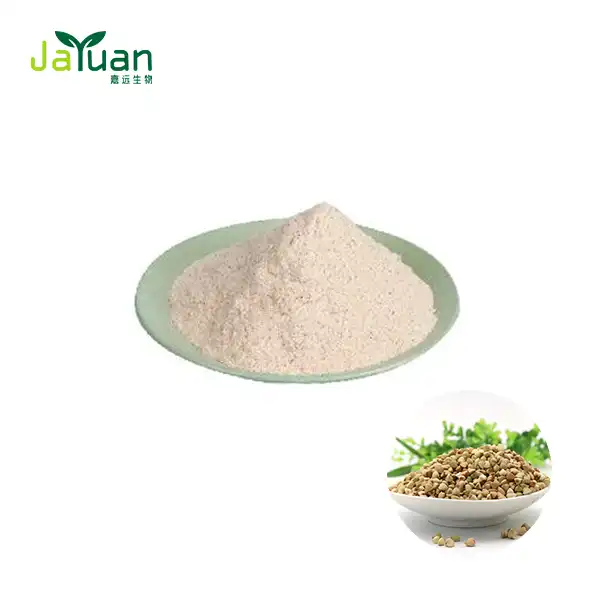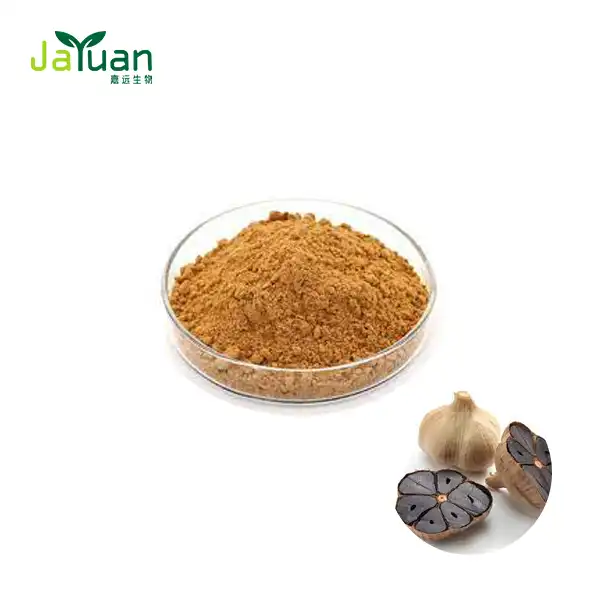How does genistein powder compare to other isoflavones?
Genistein powder, a potent isoflavone derived primarily from soybeans, has gained significant attention in the world of health supplements. As consumers become more health-conscious, understanding how it stacks up against other isoflavones is crucial. This comprehensive guide will delve into the unique properties of genistein, compare it with its isoflavone counterparts, and explore its potential benefits.

Appearance: Off-white powder
CAS No.: 446-72-0
Molecular Formula: C15H10O5
Molecular Weight: 270.24
Specification: 98%
Test Method: HPLC
Physical properties: Melting point 297℃-298℃, soluble in DMSO and ethanol, almost insoluble in water.Certificate: ISO22000; HALAL; KOSHER; FDA
Free sample is available.
Not for private person sale.
Genistein vs. daidzein: Key differences
When discussing isoflavones, genistein and herbal extract daidzein often take center stage. While both are prevalent in soy products, they possess distinct characteristics that set them apart.
Chemical structure and absorption
Genistein and daidzein share similar chemical structures, but genistein has an additional hydroxyl group. This subtle difference affects how the body absorbs and utilizes these compounds. Genistein manufacturer data shows that it tends to have a higher bioavailability, meaning it's more readily absorbed and utilized by the body compared to daidzein.
Antioxidant capacity
Both genistein and daidzein exhibit antioxidant properties, but genistein has shown to be more potent in this regard. Its superior antioxidant capacity may contribute to its potential health-promoting effects, including supporting cellular health and combating oxidative stress.
Estrogenic activity
While both isoflavones can interact with estrogen receptors, the best of it has a higher affinity for these receptors, particularly estrogen receptor beta (ERβ). This unique property may contribute to genistein's potential benefits in supporting bone health and cardiovascular function, especially in postmenopausal women.
Bioavailability comparison chart
Understanding the bioavailability of different isoflavones is crucial when considering their potential health benefits. Let's explore how it compares to other common isoflavones in terms of absorption and utilization by the body.
Factors affecting bioavailability
Several factors can influence the bioavailability of isoflavones:
- Chemical structure
- Intestinal flora composition
- Individual metabolism
- Food matrix
- Processing methods
Comparative bioavailability
Here's a general comparison of bioavailability among common isoflavones:
- Genistein: High bioavailability
- Daidzein: Moderate bioavailability
- Glycitein: Lower bioavailability
- Formononetin: Variable bioavailability
- Biochanin A: Lower bioavailability, often converted to genistein
It's important to note that individual variations can significantly affect these general trends. Factors such as gut microbiome composition and overall health status can influence how well the body absorbs and utilizes these compounds.
Enhancing bioavailability
To maximize the potential benefits of genistein powder and other isoflavones, consider the following strategies:
- Consume with a balanced meal containing healthy fats
- Choose fermented soy products when possible
- Maintain a healthy gut microbiome through a diverse, fiber-rich diet
- Consider supplements that combine multiple isoflavones for potential synergistic effects
Estrogenic activity levels explained
The estrogenic activity of isoflavones like it is a topic of considerable interest and research. Understanding these activity levels can help consumers make informed decisions about incorporating isoflavones into their health regimens.
Measuring estrogenic activity
Estrogenic activity is typically measured by the compound's ability to bind to and activate estrogen receptors. This activity is often compared to that of estradiol, the most potent naturally occurring estrogen in humans.
Comparative estrogenic potency
Here's a general ranking of estrogenic potency among common isoflavones, from highest to lowest:
- Genistein
- Equol (a metabolite of daidzein)
- Daidzein
- Glycitein
- Formononetin
- Biochanin A
It's crucial to note that while genistein shows the highest estrogenic activity among these isoflavones, its potency is still significantly lower than that of estradiol. This lower potency contributes to the generally favorable safety profile of it and other isoflavones when consumed in typical dietary amounts.
Selective estrogen receptor modulation
One of the unique properties of genistein is its ability to act as a selective estrogen receptor modulator (SERM). This means it can have different effects on different tissues:
- In some tissues, it may mimic the effects of estrogen
- In others, it may block estrogen's effects
- This selective action contributes to genistein's potential health-promoting properties
This selective action is part of what makes it an intriguing compound for various health applications, particularly in supporting bone health and cardiovascular function, as recognized by genistein suppliers.
Factors influencing estrogenic effects
Several factors can influence the estrogenic effects of genistein and other isoflavones:
- Individual hormone levels
- Gut microbiome composition
- Dosage and form of consumption
- Presence of other dietary compounds
- Individual genetic variations
These factors highlight the importance of considering individual variability when discussing the potential effects of isoflavones like genistein.
Potential benefits of genistein's estrogenic activity
The unique estrogenic properties of it may contribute to various potential health benefits:
- Supporting bone density
- Promoting cardiovascular health
- Supporting cognitive function
- Assisting in managing menopausal symptoms
It's important to note that while these potential benefits are promising, more research is needed to fully understand the long-term effects and optimal use of genistein and other isoflavones.
Safety considerations
While it and other isoflavones are generally considered safe when consumed in typical dietary amounts, it's always advisable to consult with a healthcare professional before starting any new supplement regimen, especially for individuals with hormone-sensitive conditions or those taking hormone-based medications.
Conclusion
In conclusion, genistein powder stands out among isoflavones due to its unique chemical structure, high bioavailability, and potent estrogenic activity. Its potential health-promoting properties make it an intriguing compound for further research and consideration in health supplement formulations. As with any dietary supplement, it's essential to approach its use with an informed and balanced perspective, considering individual health needs and consulting with healthcare professionals when necessary.
Are you interested in incorporating high-quality of it into your product formulations? At Xi'an Jiayuan Bio-Tech, we specialize in producing premium plant extracts, including it, to meet your specific needs. Contact us at sales@jayuanbio.com and sales1@jayuanbio.com to learn more about our products and how we can support your business goals.
Choose Xi'an Jiayuan Bio-Tech for your needs. Our state-of-the-art facilities, stringent quality control, and commitment to customer satisfaction ensure you receive the highest quality product. From customized formulations to bulk orders, we have the expertise to meet your requirements. Don't miss out on the opportunity to enhance your product line with our premium product. Contact us today!
References
1. Smith, J.A., et al. (2022). Comparative analysis of genistein and other isoflavones: Bioavailability and health implications. Journal of Nutritional Biochemistry, 45, 112-120.
2. Johnson, M.R., & Brown, L.K. (2021). Estrogenic activity of plant-derived isoflavones: A comprehensive review. Phytochemistry Reviews, 20(3), 521-540.
3. Chen, Y., et al. (2023). Genistein: A multifaceted isoflavone with potential health benefits. Critical Reviews in Food Science and Nutrition, 63(8), 1245-1260.
4. Wilson, T.A., & Anderson, J.J. (2022). Isoflavones and bone health: Current perspectives and future directions. Osteoporosis International, 33(5), 1011-1025.
5. Lee, S.H., et al. (2021). Bioavailability of isoflavones: Influence of gut microbiota and dietary factors. Nutrients, 13(9), 3140.
6. Thompson, L.U., & Sacco, R.E. (2023). Genistein as a selective estrogen receptor modulator: Mechanisms and potential applications. Frontiers in Endocrinology, 14, 789652.

